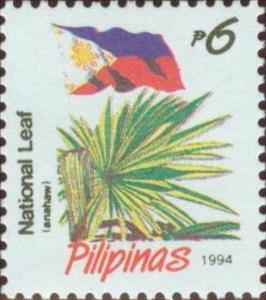Stamp: National leaf (Anahaw), re-drawn (Philippines 1994)
National leaf (Anahaw), re-drawn (Philippines 1994)
01 December (Philippines ) within release Philippine Flag and National Symbols goes into circulation Stamp National leaf (Anahaw), re-drawn face value 6 Philippine piso
| Stamp National leaf (Anahaw), re-drawn in catalogues | |
|---|---|
| Michel: | Mi:PH 2470II |
Stamp is square format.
|
Data entry completed
50%
|
|
|---|---|
| Stamp National leaf (Anahaw), re-drawn in digits | |
| Country: | Philippines |
| Date: | 1994-12-01 |
| Print: | Unknown |
| Emission: | Definitive |
| Format: | Stamp |
| Face Value: | 6 Philippine piso |
Stamp National leaf (Anahaw), re-drawn it reflects the thematic directions:
A flag is a piece of fabric (most often rectangular or quadrilateral) with a distinctive design that is used as a symbol, as a signaling device, or as decoration. The term flag is also used to refer to the graphic design employed, and flags have since evolved into a general tool for rudimentary signalling and identification, especially in environments where communication is similarly challenging (such as the maritime environment where semaphore is used). National flags are patriotic symbols with varied wide-ranging interpretations, often including strong military associations due to their original and ongoing military uses. Flags are also used in messaging, advertising, or for other decorative purposes. The study of flags is known as vexillology, from the Latin word vexillum, meaning flag or banner.
Flora is the plant life occurring in a particular region or time, generally the naturally occurring or indigenous—native plant life. The corresponding term for animal life is fauna. Flora, fauna and other forms of life such as fungi are collectively referred to as biota. Sometimes bacteria and fungi are also referred to as flora, as in the terms gut flora or skin flora.


